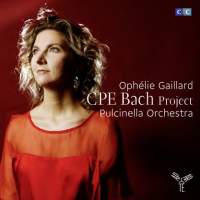Texte paru dans: / Appeared in: |
|
|
|
|
|
Reviewer: Lynn
René Bayley From the first note of this disc, the historically informed (don’t you just love that title?) Pulcinella Orchestra rips into C. P. E. Bach’s Cello Concerto in A Minor with verve and élan. So far, so good. Ophélie Gaillard, our cellist-conductor, enters playing with a fine style, but with an excessively dry and unpleasant tone. In this case, I can’t blame the sonics; they are crisp and forward. The problem lies in Gaillard’s insistence on not modifying her timbre at all with any vibrato, which leads to an excessively dry, unpleasant, and somewhat scratchy tone. Thus is the music sacrificed on the altar of “historical” performance practice. This is a shame, as Gallard is quite obviously a serious and dedicated musician, but I just can’t get past that ugly tone. If Gaillard had something interesting and personal to say with the music other than exuberance and energy, I might have been able to overlook this, but she does not. In common with so many young classical musicians nowadays, she has no idea how to make the music speak other than to make it sound jumpy and exciting. After a while, the unrelenting energy and peppiness of this performance becomes wearing. Moreover, the sinfonia and the Cello Concerto in A Major don’t sound any different—and therein lies another problem. Do these musicians play every single dad-blamed piece exactly the same way? Our ears finally gain a respite in the trio sonata that concludes this disc. Here, mercifully, Gaillard is relegated to a continuo role, so her dry, ugly timbre is not an issue, and violinists Thibault Noally (Pulcinella’s leader and soloist) and Nicolas Mazzoleni, though likewise employing strict straight tone, have much sweeter timbres. Yet even here, I sensed a loss of proper style; C. P. E.’s trademark tempo changes, which can sound so emotional and meaningful in the hands of sensitive musicians, sound meaningless here because the musicians’ tempo shifts are very mechanical-sounding. Everything is cut-and-dry. Alas, then, I cannot recommend this disc. Since Anner Bylsma, in his famous recording with conductor Gustav Leonhardt, did not sound as dry and percussive as this, I recommend their performances of the cello concertos. | |
|
|
|
|
|
|
|
Cliquez l'un ou l'autre
bouton pour découvrir bien d'autres critiques de CD |
|




